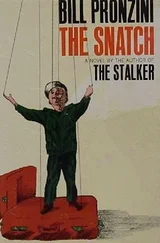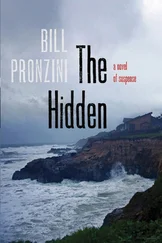Bill Pronzini - The Vanished
Здесь есть возможность читать онлайн «Bill Pronzini - The Vanished» весь текст электронной книги совершенно бесплатно (целиком полную версию без сокращений). В некоторых случаях можно слушать аудио, скачать через торрент в формате fb2 и присутствует краткое содержание. Жанр: Детектив, на английском языке. Описание произведения, (предисловие) а так же отзывы посетителей доступны на портале библиотеки ЛибКат.
- Название:The Vanished
- Автор:
- Жанр:
- Год:неизвестен
- ISBN:нет данных
- Рейтинг книги:3 / 5. Голосов: 1
-
Избранное:Добавить в избранное
- Отзывы:
-
Ваша оценка:
- 60
- 1
- 2
- 3
- 4
- 5
The Vanished: краткое содержание, описание и аннотация
Предлагаем к чтению аннотацию, описание, краткое содержание или предисловие (зависит от того, что написал сам автор книги «The Vanished»). Если вы не нашли необходимую информацию о книге — напишите в комментариях, мы постараемся отыскать её.
The Vanished — читать онлайн бесплатно полную книгу (весь текст) целиком
Ниже представлен текст книги, разбитый по страницам. Система сохранения места последней прочитанной страницы, позволяет с удобством читать онлайн бесплатно книгу «The Vanished», без необходимости каждый раз заново искать на чём Вы остановились. Поставьте закладку, и сможете в любой момент перейти на страницу, на которой закончили чтение.
Интервал:
Закладка:
Saturday, October 30. What had happened on that day that could have put Sands into the kind of low-down blue funk that provokes a guy into a major session with a bottle? Apparently he had been all right when he’d left Larson Barracks to come into Kitzingen that day, so whatever it was was unlikely to be connected with the military installation. Something in Kitzingen, or in the surrounding area, then? That was an angle-not much, maybe, but it was worth looking into.
I returned to the Bayerischer Hof and asked the desk man if there was a daily newspaper circulated in Kitzingen that covered the local news. He told me that the Main-Post, which was published in Würzburg to the north, carried all news pertaining to the Main River region. The Main-Post had an office in Kitzingen, and he gave me directions to it.
I drove over there, and they had a guy in the small office who spoke English. I told him what I wanted and why, and he put me at an unused desk and disappeared into another room. He came back with a stack of papers covering the week prior to the thirtieth of October, and the Monday and Tuesday following it; after depositing them in front of me, he hovered nearby-either out of curiosity or to make sure that I did not damage any of the editions.
I went through them laboriously, beginning with the paper dated the thirtieth, working backward to the twenty-sixth. I had recalled enough German by now to be able to read most of the headlines and, if anything looked promising, the lead paragraph or two of the accompanying story; when I came to something I could not understand, I asked the guy about it. At the end of an hour, however, I had learned nothing.
I sighed and spread out the issue dated November 1. I went through the initial two pages and half of page three. And I came to the headline spread over three columns at the left-hand margin:
AMERIKANISCHES MÄDCHEN
ERHÄNGT SICH IN KITZINGEN
Translated, that read: AMERICAN GIRL HANGS SELF IN KITZINGEN. I frowned and called the English-speaking guy over and opened my notebook and had him translate the story slowly, so I could write it down as he did so in a form of shorthand I had worked out over the years. It reads this way:
Diane Emery, a young American girl and promising artist, hanged herself in her Kitzingen studio at Gartenweg 19 early last Saturday. Suspended from a ceiling fixture by a length of clothesline, her body was discovered by Mrs. Ursula Mende, another tenant of the building.
Miss Emery had lived in Kitzingen for the past year, having studied in Paris for the three years previous. Her oil work has been exhibited in Munich and Paris, as well as locally, and has drawn high praise from critics.
No suicide note was found, and no immediate explanation could be determined for Miss Emery having taken her own life. However, it was conjectured by Kriminalbeamter Franz Hüssner that she may have been despondent with personal problems.
That was all-but it was enough to give rise to a small, excited tingling at the base of my neck. This could be the key, the nucleus of the whole affair. Diane Emery had been an artist, a painter, and Roy Sands had sat for a portrait that had some sort of significance; the Emery girl’s work had been exhibited locally, and Sands had had the address of the Galerie der Expressionisten. Had they known each other, then? Had knowledge of her death been the reason for Sands’ drinking bout? A dozen other questions and half as many suspicions floated across my mind; but I did not as yet have enough information to answer any of them.
I went out to get it.
Herr Ackermann said solemnly, ‘Ah yes, of course I knew Fräulein Emery. Her death was a terrible tragedy.’
‘Then she did exhibit some of her paintings here?’
‘Yes, several in the past year.’
‘Was she talented?’
‘Oh, very much so,’ Herr Ackermann said. ‘She was deeply involved in her work-a true artisan.’
‘Do you have any idea why she would commit suicide?’
He sighed. ‘She was also quite an emotional girl, given to many moods, to spells of dark depression. That is the only reply I can offer you.’
‘The news story hinted at personal problems.’
‘I know of none in particular,’ Herr Ackermann said. ‘I had not seen her for some weeks prior to her death.’
‘Did she ever confide in you?’
‘No. We discussed only art.’
‘Do you know if she had any special male friends?’
‘She spoke of none to me.’
‘Would you happen to have any of her paintings at the moment?’
‘I have two. Following her death, several were purchased.’ He made a gesture of distaste. ‘The public can be as swift and as morbid as vultures at times.’
‘Yeah,’ I said.
‘Would you like to see the paintings?’
‘Please.’
We went through the curtained arch into the second display room of the gallery. On the far wall, Herr Ackermann indicated a pair of rectangular canvases hung one above the other. I looked closely at them, and they were austere, brooding things painted in dark colors with heavy brushstrokes-and yet both were vivid and compelling. One was called ‘Deathwatch,’ and the other ‘Earthlove’: the former depicted, as near as I could tell, a sea of frightened faces staring with Keane-like eyes at a prostrated ancient in a flowing white beard; and the latter grimly portrayed a pair of mounded graves laid side by side, with a man’s hand jutting diagonally outward through the spaded earth of one to clasp a woman’s hand extended from the other, the third fingers of each encircled by a simple gold wedding band.
A coldness settled on my spine, and I turned away to look at Herr Ackermann. ‘Was she a fatalist?’
‘Perhaps existentialist would be a better term.’
‘But she was preoccupied with death?’
‘I suppose you could say she was. Many great artists are, you know.’
Ergo, she was fully capable of suicide, I thought. All right, so that proves what? That she killed herself? You knew that from reading the newspaper story. Don’t make waves on a calm sea, for Christ’s sake.
I studied both paintings again, looking at the style this time rather than the scenes themselves. Even though there seemed to be similarities between these oils and the sketch of Roy Sands-some of the same exaggeration of masculinity, for example-I was not enough of a connoisseur to be able to determine beyond a reasonable doubt that she had created the sketch. Maybe Herr Ackermann could have, but as he had said earlier, he would have to have seen the portrait itself in order to make a judgment.
He said, ‘Do you think Fräulein Emery was acquainted with this man you are seeking- Sands is his name? And that she made this sketch about which you asked me earlier?’
‘There’s a chance of it,’ I told him. ‘Did she ever do any portrait work that you know about?’
He shook his head. ‘She was a true impressionist.’
‘But she might have-as a favor, or as a gesture of some kind, mightn’t she?’
‘Perhaps. She was, as I said, an unpredictable girl.’
‘Okay then. Thanks again for your time, Herr Ackermann.’
‘I hope you succeed in your quest, sir,’ he said, and bowed. ‘Auf Wiedersehen.’
I walked out and got into the Volkswagen. In my mind’s eye I kept seeing that painting called ‘Earthlove’-the pair of hands reaching out of the graves, clasped together, the wedding rings plainly evident. The morning seemed suddenly colder.
And when I drove away from there, it was with the disturbing mental image of a faceless girl hanging dead and motionless in a room filled with the tools, the wonderment, of creation.
CHAPTER THIRTEEN
Интервал:
Закладка:
Похожие книги на «The Vanished»
Представляем Вашему вниманию похожие книги на «The Vanished» списком для выбора. Мы отобрали схожую по названию и смыслу литературу в надежде предоставить читателям больше вариантов отыскать новые, интересные, ещё непрочитанные произведения.
Обсуждение, отзывы о книге «The Vanished» и просто собственные мнения читателей. Оставьте ваши комментарии, напишите, что Вы думаете о произведении, его смысле или главных героях. Укажите что конкретно понравилось, а что нет, и почему Вы так считаете.












